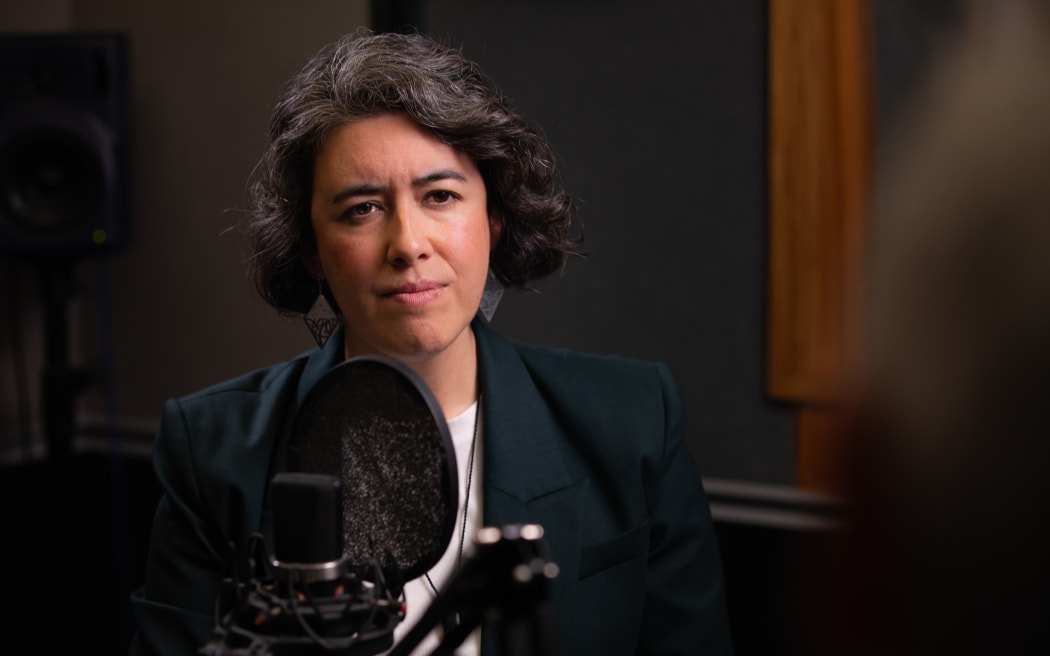
Children’s Commissioner Dr Claire Achmad Photo: RNZ / Cole Eastham-Farrelly
Warning: This story discusses suicide.
New Zealand has the highest suicide rate for children, a survey of wealthy countries shows.
The latest UNICEF Innocenti Report Card 19: Fragile Gains - Child Wellbeing at Risk in an Unpredictable World ranked New Zealand 32nd out of 36 countries for overall child wellbeing.
It ranked Aotearoa last place for child and youth mental health.
The report card showed New Zealand had the highest suicide rate for children out of the 36 OECD and EU countries, at a rate of almost three times higher than the average.
It also showed that New Zealand's children face a major problem when it comes to bullying, with the second highest rate of children experiencing bullying out of the countries included.
Chief Children's Commissioner Dr Claire Achmad said the rankings showed that meaningful investment in children and young people was urgently needed to support child and youth mental health, including suicide prevention measures, and better support for the prevention of bullying in schools and communities.
"I've been clear that we need to see a central focus on children in Budget 2025," she said. "This is necessary to deliver on the government's own Child and Youth Strategy to 'make New Zealand the best place in the world to be a child'.
"It's devastating that among other high-income countries, we reported the highest youth suicide rate. We also know that attempted suicide rates for rangatahi Māori, Rainbow children and young people and disabled children are higher."
Dr Achmad said she wanted the government to collect and publish good-quality data on child mortality.
"Significantly reducing childhood poverty must be a core investment area for the government, given the ripple effects it has on children's lives. The data in the government's own recent Annual Report on Children and Young People's wellbeing shows that we are going backwards when it comes to providing enough safe housing, healthy food and primary health and dental care." she said.
"I want to see all children in our country flourish to their full potential. As this international comparison shows, we can and must do much, much better for children. These are their basic rights that we are talking about, and as a small, relatively rich country, it shouldn't be like this."
Hauora Aotearoa works in schools helping tamariki with mental health.
Its chief executive Jase Te Patu told Midday Report the statistics were another wake-up call for government ministers.
"This is alarming, but also no surprise given that since 2010 we've always [been] amongst the highest youth suicide rates in the world in developed countries," Te Patu said.
"If there's such a crisis there should be more services available."
Te Patu said the government has given funding boosts to large mental health services, but is forgetting about smaller community businesses that are struggling to find funding to stay afloat.
He said two of his friends who run mental health services in their communities have had to close down due to lack of funds.
"The biggest thing is [to] get as many services as you can, especially out into the communities that can't afford this type of service," Te Patu said.
"Make it available so that [we don't] end up with the statistics we are seeing in the news today."
UNICEF Aotearoa's Tania Sawicki Mead told Morning Report that the data showed that children's health was holistic in terms of their mental and physical health and educational achievement.
Important factors which helped to support children and shape their wellbeing were not necessarily that complicated, she said.
"It's about protection, belonging, having a sense of community, it's about secure housing, it's about having enough food on the table, it's about addressing poverty, marginalisation and racism.
"All of these things, you know in aggregate make a huge impact on children's mental wellbeing, but they also obviously have significant impacts on their life satisfaction, their physical health and so on."
The survey took place during the Covid pandemic which lead to an increase in the sense of disconnection felt by many children, she said.
"It [the pandemic] exacerbated existing patterns of inequality for young people who are already most vulnerable, so children who didn't already have sufficient food or income in their families, who were struggling with isolation, children with disabilities, Māori and Pacific young people."
UNICEF research showed there was no silver bullet to fix social media issues, she said.
Sawicki Mead said a holistic approach was also needed to deal with social media issues looking at regulation of the companies managing social media online spaces and the way that platforms are monitored and made safe and appropriate for children.
Children also needed to be empowered to engage in online spaces and their views, perspective and knowledge needed to be included, she said.
Where to get help:
- Need to Talk? Free call or text 1737 any time to speak to a trained counsellor, for any reason.
- Lifeline: 0800 543 354 or text HELP to 4357.
- Suicide Crisis Helpline: 0508 828 865 / 0508 TAUTOKO. This is a service for people who may be thinking about suicide, or those who are concerned about family or friends.
- Depression Helpline: 0800 111 757 or text 4202.
- Samaritans: 0800 726 666.
- Youthline: 0800 376 633 or text 234 or email talk@youthline.co.nz.
- What's Up: 0800 WHATSUP / 0800 9428 787. This is free counselling for 5 to 19-year-olds.
- Asian Family Services: 0800 862 342 or text 832. Languages spoken: Mandarin, Cantonese, Korean, Vietnamese, Thai, Japanese, Hindi, Gujarati, Marathi, and English.
- Rural Support Trust Helpline: 0800 787 254.
- Healthline: 0800 611 116.
- Rainbow Youth: (09) 376 4155.
- OUTLine: 0800 688 5463.
If it is an emergency and you feel like you or someone else is at risk, call 111.
Sign up for Ngā Pitopito Kōrero, a daily newsletter curated by our editors and delivered straight to your inbox every weekday.




